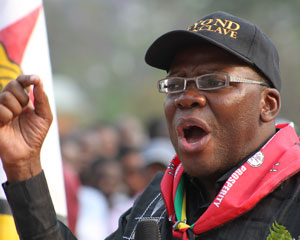
BY NDAMU SANDU INFIGHTING in Zanu PF will spill into government with serious ramifications on the economy as factions tussle for control ahead of next year’s elective congress, analysts have warned.
The infighting took a new turn last week after five Zanu PF officials, believed to be linked to Justice Minister Emmerson Mnanga-gwa in the Midlands filed a US$50 million criminal defamation lawsuit against provincial minister, Jayson Machaya, a perceived ally of Vice President Joice Mujuru.
Mujuru and Mnangagwa are believed to be positioning themselves to succeed 89-year-old President Robert Mugabe. The two have however, said that they do not have presidential ambitions.
Machaya recently won the race for the Zanu PF chairmanship, shrugging off the close challenge of Larry Mavima, who is linked to the Mnangagwa camp.
So far, Zanu PF has conducted elections in two provinces—Midlands and Manicaland which were bagged by a faction allegedly linked to Mujuru.
Factions want to control provinces ahead of next year’s congress where a successor to Mugabe is likely to emerge.
Analysts warned that if unchecked, the tussle for positions in Zanu PF will affect government business.
“Zanu PF is the party occupying the seat of government and if it fails to address these internal fissures they will spill into the public domain and affect us all,” said Phillip Pasirayi, director of the Centre for Community Development Zimbabwe (CCDZ).
- Chamisa under fire over US$120K donation
- Mavhunga puts DeMbare into Chibuku quarterfinals
- Pension funds bet on Cabora Bassa oilfields
- Councils defy govt fire tender directive
Keep Reading
University of Zimbabwe political science lecturer, Shakespeare Hamauswa said the fact that there were factions in Zanu PF showed that there were ideological differences and the infighting will escalate.
He said chances were high that budget allocations can be used to settle scores among factions.
“We are going to see a new version of the inclusive government but within one party,” he said.
Zanu PF accused former Finance minister and MDC-T secretary-general, Tendai Biti of allocating more resources to MDC-T ministries in the inclusive government. The security sector has been accused of being an appendage of Zanu PF, justifying calls for reforms in the sector. In the inclusive government, the two MDC formations pushed, with no success, security sector reforms that would have penalise officer who dabble in politics.
Pasirayi said there were powerful sharks within Zanu PF who are seeing an opportunity to land the highest office, in the event that Mugabe does not finish his current term due to failing health and old age.
“But if not properly checked these unbridled ambitions can cripple the party to the extent that there will be no party to speak of,” he said. “If the factions fail to play it smart then the possibility of dirtier tactics being deployed by either faction to eliminate competition cannot be ruled out.”
Pasirayi said Mugabe was the biggest beneficiary of the political tussle and its outcome “depends on his ability to continue managing the factions or playing them off against each other”.
He said using the courts could be an avenue to settle factional scores.
Lewanika said the courts were captured institutions to Zanu PF and it would “depend on whose favour they seem aligned to, and whoever thinks they do not align in their favour will not see them as an option”.
“Besides the challenges that are there, the battles being fought are political more than they are legal and the solutions thereof will still be found in the politics rather than the legal realm,” he said.
Hamauswa said the only thing that was holding Zanu PF together was the elections, in which the party had to win at all costs. Now that elections have come and gone, Hamauswa said, the factions were back at each other’s throats.
Hamauswa said only Mugabe can resolve the infighting by resolving the succession issue.
“If he appoints a successor, everyone will follow suit,” he said.
LINES BETWEEN PARTY AND STATE ARE BLURRY: LEWANIKA
Crisis in Zimbabwe Coalition (CiZC) director, McDonald Lewanika said the infighting was part of a political contest as the stakes were high, “as it seems in Zanu PF that whoever eventually takes it [party]over will also eventually take over the State when Mugabe is gone”.
He said Zanu PF’s occupation of the state by itself has meant a return to the days of the one-party state, that is, what the party decides and fights over or discusses will be replicated in government.
“Look at the issue of tying civil servants salaries to PDL [poverty datum line] — it’s an announcement made after politburo by Rugare Gumbo [Zanu PF spokesperson] — not by the government minister responsible,” said Lewanika. “So developments in the party will affect the functioning of government, in as far as Zanu PF has blurred the lines between the party and the state.”
He warned that the infighting will be brutal but cautioned that Zanu PF always found common ground when pressured by an “external enemy”.
“They may fight each other internally and brutally so, but one of the lessons that we have learnt from Zanu PF is that even with different leaders, when faced with external enemies they come together, amalgamate and put aside differences to win the external fight in order to resume the internal one as a fraternity,” he said.
Asked whether Mugabe is the glue that is holding Zanu PF together, Lewanika said “Mugabe just happens to be the leader that is there, but the party is sustained and held by a system that is beyond him as an individual”.











